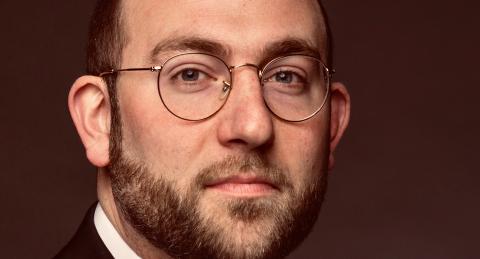
Describe what you are currently doing for work and your path.
Currently, I'm the Music Department chair, director of music technology and composition, and assistant professor of music and computer science at Albright College, where I teach courses in audio engineering, music production, songwriting, sound design, video game design and development, and game audio. I was a music education major at UNH, and I played percussion and drums in every ensemble available to me. At the same time, I was very interested in electronic dance music and hip-hop, and I made beats and mixtapes while finishing my undergraduate degree. After completing my B.M., I attended Tufts University to get my Masters in Music, where I completed a thesis on the use of the Akai MPC drum machine and sampler in the instrumental hip-hop music of artists like J Dilla and Madlib. I decided to build on that research by moving out to Los Angeles and completing a doctoral dissertation on how changes in technology — music software, specifically — have influenced music producers across media, from hip-hop and EDM to video games and virtual reality applications. While in LA, I continued to perform as a DJ and produce as a sound designer working on video games and virtual reality projects. At the same time, I taught in the UCLA Music Industry Program and the Pomona College Music Department, and worked as a visiting assistant professor of media studies at Pitzer College.
How did your education in your program and COLA prepare you for life after college?
It's often assumed that a college education should give you the hard skills needed to succeed in a given industry. More importantly, COLA taught me not only how to become a professional music teacher/ performer/ composer, but also how to change the music industry for the better. The combination of my major curriculum and general education courses gave me the critical thinking skills necessary to navigate a constantly changing 21st century job market.
What person or course most influenced you while at UNH?
During my first year English composition course at UNH, I was given an assignment to interview one of my music professors on the topic of "why we write about music." That one interview with Dr. Rob Haskins led me down a lifelong path of exploring the roles music serves in the social and cultural lives of people all around the world. In my four years working with Dr. Haskins, I learned that all pieces of music carry embedded within them vast histories, cultural practices and ways of knowing the world that go far beyond the notes on the page. My mentorship with Dr. Haskins, combined with the many courses I took for my philosophy minor, inspired me to pursue graduate school so I could become a musicologist and teach students in higher education.
What do you know now that you wish you'd known while at UNH?
It wasn't until I moved out to Los Angeles and started teaching on music industry related topics that I came to understand what types of jobs were available to music students after College. I'm a little biased, because I teach in a Music Industry Studies program right now, but I think all higher ed music programs should spend time on pre-professional development and informing students of the types of jobs that they could get both in and out of their major industry.
What advice do you have for students interested in your field?
It's easy for students in music and the arts to box themselves into their comfort zones, because that's often where their social scene resides. One of the most important things I teach students is to pursue creative collaborations outside of their main artistic discipline, apply creative principles from other arts to their own and to become a lifelong learner of music. To start on this path, students have to become critical listeners. We've grown so accustomed to listening to music playlists curated for us by artificial intelligence "assistants" through plastic speakers that the *experience* of music can feel devalued. Pursuing a life in music — regardless of whether you're a performer, composer, producer, marketing agent, historian, etc.—means constantly relearning how to allow music to move you, and to be able to inspire that unique passion in others.
What else would you like to share?
I've published a book through Oxford University Press on music production, music technology and software design titled, "Push: Software Design and the Cultural Politics of Music Production."